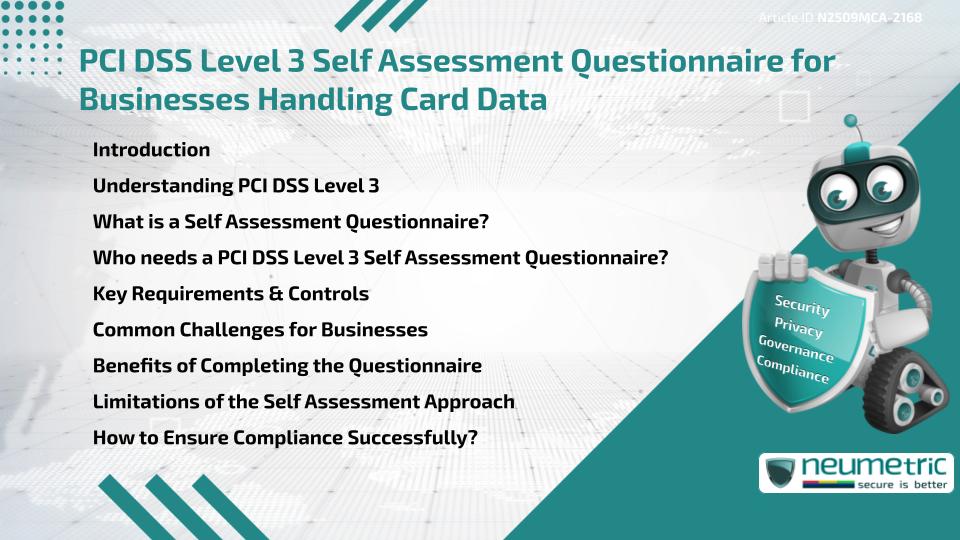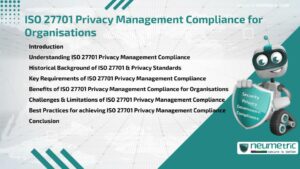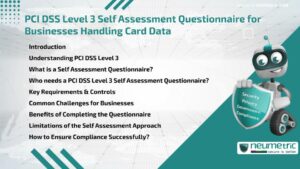Table of Contents
ToggleIntroduction
The PCI DSS level 3 Self Assessment Questionnaire is a validation tool designed for businesses that handle Cardholder Data but process a moderate volume of transactions. It allows merchants to confirm Compliance with the Payment Card Industry Data Security Standard [PCI DSS] without requiring a full External Audit. Level 3 typically applies to merchants processing between twenty thousand (20,000) & one (1) million transactions annually through E-Commerce or other Card-Not-Present channels.
This Article explores what the PCI DSS level 3 Self Assessment Questionnaire is, who needs it, its key requirements, challenges, benefits & limitations. It also highlights how businesses can prepare & maintain Compliance effectively while safeguarding Customer Trust & avoiding penalties.
Understanding PCI DSS Level 3
PCI DSS is a global Standard created by major Card Brands like Visa, Mastercard & American Express to protect Cardholder Data. It defines twelve (12) security requirements that apply across all levels of merchants.
Level 3 refers to merchants with an intermediate transaction volume, specifically E-Commerce businesses processing between twenty thousand (20,000) & one (1) million transactions annually. These merchants are not considered small enough for the simplest forms but are also not large enough to warrant a full onsite Audit. Instead, they must complete a PCI DSS level 3 Self Assessment Questionnaire.
What is a Self Assessment Questionnaire?
A Self Assessment Questionnaire [SAQ] is a validation tool that allows merchants to demonstrate Compliance with PCI DSS by answering structured questions about their security practices. The SAQ contains yes/no questions related to the twelve (12) core requirements of PCI DSS, covering areas like Network Security, Encryption & Monitoring.
There are multiple SAQ types, each designed for specific payment environments. For example, SAQ A is for E-Commerce merchants outsourcing payment processing, while SAQ D is the most comprehensive for businesses handling card data directly. Level 3 merchants must choose the correct SAQ type based on how they store, process or transmit Cardholder Data.
Who needs a PCI DSS Level 3 Self Assessment Questionnaire?
The PCI DSS level 3 Self Assessment Questionnaire applies to merchants processing:
- Between twenty thousand (20,000) & one (1) million E-Commerce transactions annually.
- Other Card-Not-Present transactions that fall within the same volume range.
It is most relevant to medium-sized online businesses, subscription services & digital platforms that handle recurring payments. These Organisations must validate Compliance annually using the appropriate SAQ & may also need to submit quarterly network scans by an Approved Scanning Vendor [ASV].
Key Requirements & Controls
The PCI DSS level 3 Self Assessment Questionnaire requires businesses to validate controls across twelve (12) PCI DSS requirements, including:
- Installing & maintaining Firewalls.
- Encrypting Data Transmissions.
- Protecting stored Cardholder Data.
- Implementing strong Access Control Measures.
- Monitoring & testing Networks.
- Maintaining an Information Security Policy.
While the scope of validation depends on the SAQ type, merchants must ensure that their environment is secure & aligns with these requirements.
Common Challenges for Businesses
Many businesses face difficulties when completing the PCI DSS level 3 Self Assessment Questionnaire. Common issues include:
- Identifying the correct SAQ type.
- Ensuring Third Party Providers are compliant.
- Managing Security Controls across distributed systems.
- Keeping Documentation & Evidence up to date.
Smaller teams often lack in-house expertise, making Compliance feel complex & resource-intensive.
Benefits of Completing the Questionnaire
Completing the PCI DSS level 3 Self Assessment Questionnaire provides several benefits:
- Demonstrates commitment to protecting Customer Data.
- Reduces the Risk of Breaches & Fraud.
- Helps avoid costly non-Compliance penalties.
- Builds trust with Banks, Card Networks & Customers.
By validating security practices annually, businesses can strengthen their overall Risk Management approach.
Limitations of the Self Assessment Approach
While useful, the SAQ approach has limitations. It relies heavily on self-reporting, which may lead to inaccuracies if businesses do not fully understand or implement the requirements. Unlike a full Audit, it does not always provide independent assurance.
Therefore, businesses must ensure honesty & diligence when completing the Questionnaire & should consider engaging external experts for guidance.
How to Ensure Compliance Successfully?
To complete the PCI DSS level 3 Self Assessment Questionnaire effectively, businesses should:
- Map Payment Data Flows to understand where Cardholder Data resides.
- Select the correct SAQ type based on their environment.
- Regularly update Firewalls, Antivirus & Encryption Protocols.
- Train Staff on Security Best Practices.
- Conduct regular Vulnerability Scans & Penetration Tests.
Maintaining Compliance is not a one-time task but an ongoing process that requires Continuous Monitoring & Improvement.
Conclusion
The PCI DSS level 3 Self Assessment Questionnaire is a practical tool for businesses handling moderate transaction volumes. By choosing the right SAQ type, implementing proper Controls & maintaining Diligence, merchants can reduce Risks, maintain Trust & comply with PCI DSS standards.
Takeaways
- Level 3 applies to merchants with twenty thousand (20,000) to one (1) million transactions annually.
- The SAQ validates Compliance without requiring a full onsite Audit.
- Correct SAQ selection is critical to accuracy.
- Benefits include trust, reduced Risk & Regulatory Compliance.
- Limitations exist, so external guidance can strengthen Compliance efforts.
FAQ
What types of Self Assessment Questionnaires exist?
Different SAQ types exist, such as SAQ A for fully outsourced processing & SAQ D for businesses that handle Cardholder Data directly.
Is the PCI DSS level 3 Self Assessment Questionnaire mandatory?
Yes, it is mandatory for qualifying merchants to demonstrate Compliance annually.
What happens if a business fails the Questionnaire?
Failure can result in penalties, increased transaction fees or loss of the ability to process Card Payments.
Do businesses need quarterly scans in addition to the SAQ?
Yes, many Level 3 merchants must also conduct quarterly scans through an Approved Scanning Vendor [ASV].
Can a Third Party Provider handle the SAQ process?
While businesses can seek guidance from consultants, the ultimate responsibility for Compliance lies with the merchant.
Need help for Security, Privacy, Governance & VAPT?
Neumetric provides organisations the necessary help to achieve their Cybersecurity, Compliance, Governance, Privacy, Certifications & Pentesting needs.
Organisations & Businesses, specifically those which provide SaaS & AI Solutions in the Fintech, BFSI & other regulated sectors, usually need a Cybersecurity Partner for meeting & maintaining the ongoing Security & Privacy needs & requirements of their Enterprise Clients & Privacy conscious Customers.
SOC 2, ISO 27001, ISO 42001, NIST, HIPAA, HECVAT, EU GDPR are some of the Frameworks that are served by Fusion – a SaaS, multimodular, multitenant, centralised, automated, Cybersecurity & Compliance Management system.
Neumetric also provides Expert Services for technical security which covers VAPT for Web Applications, APIs, iOS & Android Mobile Apps, Security Testing for AWS & other Cloud Environments & Cloud Infrastructure & other similar scopes.
Reach out to us by Email or filling out the Contact Form…





